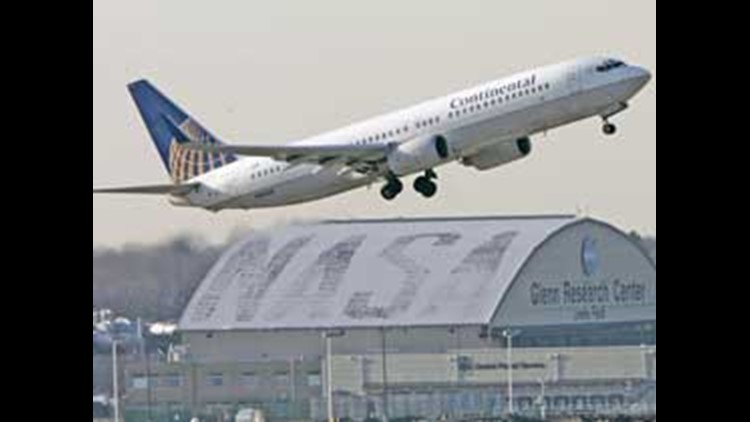Continental Airlines said Thursday it is cutting 3,000 jobs and reducing capacity by 11 percent,citing record fuel costs that have pushed the industry into its worst crisis since 9/11. It alsosaid its two top executives will forgo pay for the rest of the year.
The job cuts represent about 6.5 percent of the company's work force of 45,000.
Houston-based Continental said it will begin pulling back on flights in September, whendepartures on its mainline operations will be about 16 percent below the numbers of September 2007.For the year, capacity will fall 11 percent.
The company also said Chairman and Chief Executive Lawrence Kellner and President Jeff Smisekwill not take salaries or incentive pay for the rest of the year.
Last year, Kellner got a salary of $712,500 and total compensation that the company valued atnearly $6 million, down 9.3 percent from the year before, according to an Associated Press analysisof a company filing with the Securities and Exchange Commission.
However, about one-third of Kellner's compensation was in stock and option grants that arenow worth far less than they were when granted in February 2007 because of the slump in thecompany's stock.
Continental becomes the latest airline to make major cuts as the carriers try to cope withrecord high fuel prices, which have nearly doubled in the past year and pushed Continental to aloss of $80 million in the first quarter.
Continental officials did not immediately respond to calls for more comment. In a statement,the company said it plans to offer details on flight and destination reductions and eliminations bythe end of next week.
Continental operates a hub at Cleveland Hopkins International Airport and has more than 2,400employees in northeast Ohio.
Hopkins director Ricky Smith said the airport hasn't received details on the Continentalcuts, so it's too early to say what impact they might have.
Fewer flights will also mean fewer planes. By the end of the second quarter, Continental willoperate 375 mainline aircraft and it plans to mothball 67 planes through 2009.
The company said that several fare increases have not been enough to offset the rising costof fuel. Continental estimates it will spend $2.3 billion more this year than last.
"These actions are among many steps Continental is taking to respond to record-high fuelprices as the industry faces its worst crisis since 9/11," the company said in a statement.
Many analysts consider Continental to be the healthiest of the six big network carriers,excluding low-fare Southwest Airlines Co. But that did not make it immune to cuts.
"If they did not do it they would be irresponsible," said Ray Neidl, an analyst with CalyonSecurities.
"At current fuel prices, the old economics do not work. Ticket prices have to risedramatically, and the only way that can be achieved is by sharply reducing capacity," he said. "Thewhole industry has to show this discipline or some big airline will have to go out of business."
Continental becomes the latest airline to make sharp cutbacks.
On Wednesday, UAL Corp.'s United Airlines, the nation's No. 2 carrier, announced it would cutup to 1,100 more jobs, ground 70 airplanes and drop its coach-only service, named Ted. Two weeksago, AMR Corp.'s American Airlines, the nation's largest airline, said it would cut capacity 11percent to 12 percent after the peak summer travel season and probably eliminate thousands of jobs,though it hasn't given a figure.
Some analysts have called on U.S. carriers to shrink about 20 percent to cut spending on fueland labor. Industry executives say that would also drive up fares as passengers compete for fewerseats in the air. It could also mean the reduction or elimination of service to some smallerairports.
Continental was in advanced talks to combine with United, which would have created theworld's largest airline. But Continental walked away from the deal in April as oil prices soaredand the industry's outlook slumped.
Continental's fuel bill in the first quarter jumped 53 percent, or $364 million, and labor asthe airline's biggest expense.
That forced Continental to rethink its strategy. Last year, Continental grew by 4.1 percent,and its planes remained crowded.
But in April, it announced it would cut capacity on its U.S. network by 5 percent beginning inthe fall because of concern over fuel prices and the weakening economy.



